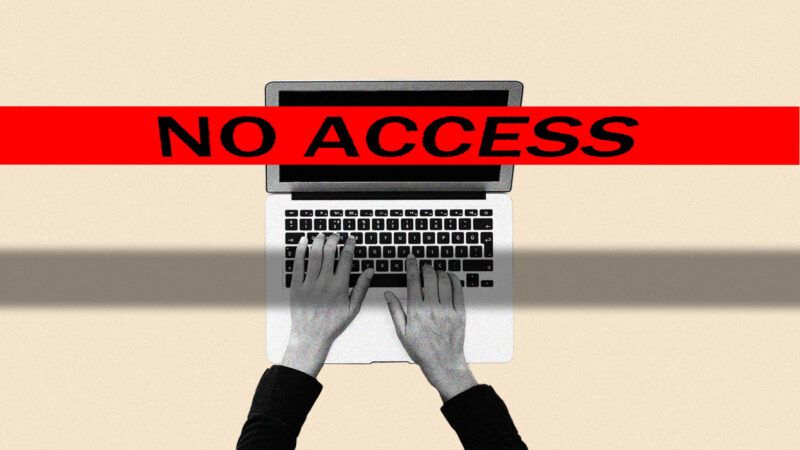What Happens When Reporters Are Barred From the Story
Their articles do not, in fact, get more accurate.

Access journalism has a bad rap, and for good reason. While it sometimes provides "all-access" insight into the psyches of the famous and powerful, it's often little more than public relations for real and would-be autocrats disguised as reporting. Yet, granting every critique of access journalism, what we might call "no-access" journalism—reporting based entirely on already public information, especially press releases or other crafted statements from the subject of the story—is surely just as bad, and a weed with roots in the press and broader public alike.
Let's begin with the press, and specifically its coverage of the war in Ukraine. Early on in the conflict, many international reporters were able to be on the ground in Ukraine, documenting the Russian invasion firsthand and picking up stories from still-active local media organizations. But as the conflict dragged on for more than six months, public interest in the war in the U.S. declined, and coverage priorities have shifted accordingly. Now it is not uncommon to see reports—particularly accounts of battlefield losses for Moscow—in which the Ukrainian government is a primary or only source for major elements of the story.
"A Russian marines brigade has been almost completely wiped out by Ukraine's Armed Forces, Kyiv said Monday," began a Newsweek article this week, citing a Facebook post by the General Staff of the Armed Forces of Ukraine and adding, "Newsweek has been unable to verify the claims."
"In the Russian-occupied regions of the Crimea and southern Ukraine, Russian proxies, intelligence officers and military commanders have begun to evacuate and 'urgently resettle their families' back into Russian territory," announced a short update from The Guardian one day later, citing "the defence intelligence of Ukraine's military of defence." Of the post's 62 words, nearly a third were direct quotes from Kyiv.
From The Daily Beast comes a report of a Russian soldier heard complaining on the phone that the war is not what he was given to expect. "I imagined all of this differently, because there's no kind of organization. I thought there was an army here, but it's not an army here," he said. "Everyone is out for themselves." It's a striking story—and also one provided by the Ukrainian defense ministry.
All of these accounts may be wholly true, and I don't mean to suggest these outlets are doing anything irregular. Each one made the source of their information perfectly clear, so there's no question of deception or sloppy work which might imply more evidence than is actually available. There will likely be updates, at least to stories on the scale of the first two, as outside observers arrive to confirm or deny what Kyiv said.
Yet for all that, there's risk in this kind of reporting from afar. These initial stories of Russian setbacks will likely be remembered by more people than will any forthcoming corrections or qualifications, not least because most of us in the audience want to see Russia on the retreat.
Moreover, the Ukrainian government, though clearly not the aggressor or instigator of this conflict, is not a neutral third party. It has interests that go well beyond journalists' purpose in documenting, analyzing, and sharing facts. (Its defense ministry, after all, is analogous to the Pentagon, which hardly has a record of disinterested honesty.) "The Ukrainian military, which is engaged in a high-intensity war of national survival, is understandably quite secretive in many respects," as Shashank Joshi, The Economist's defense editor, observed last month, and insofar as reporting relies on Kyiv's statements, "the number of reports casting a more critical eye on the performance of the Ukrainians is limited."
The troubling counterpart to this kind of reporting is an apparently rising refusal, especially among politicians, to talk to the press, either categorically or until the discussion happens on the interviewee's terms. Presidential news conferences were on a downward trend even before former President Donald Trump made haranguing and dismissing the media a standard part of his campaign performance. But Trump seemed to love seeing his name in The New York Times or a CNN chyron at least as much as he hated it, and he continued to grant interviews through the end of his time in the White House. In the present election cycle, by contrast, many politicians—mostly but not exclusively Trump acolytes—are simply avoiding or outright declining to speak to the media.
The most prominent example of this may be GOP gubernatorial candidate Doug Mastriano of Pennsylvania, who reportedly won't "respond to questions from local newspaper, digital, or television reporters" and sometimes bans journalists from campaign events.
Curiously, Mastriano's mainstream press access seems to have decreased as the general election nears, the opposite of standard political strategy to broaden appeal after the primaries. "During the primary campaign, he occasionally answered questions from mainstream media, including this reporter," concluded a recent story from Lancaster Online. "But since his victory last month, a cell phone number he used regularly is no longer answered and doesn't accept voicemails. And his official Senate office stresses its role is to deal with official business only, not reporters wondering how to reach the candidate."
The Washington Examiner's Salena Zito said her efforts to contact the Mastriano campaign were met with a public statement "by his campaign strategist that because I had not written anything nice about him, I would not be granted an interview until I wrote something that was."
Is that a standard Mastriano will keep if he wins Pennsylvania's highest office? And is it one we'll see more widely adopted by candidates eager—as Trump was and Mastriano seems to be—to use social media to bypass and steer press coverage without accepting in turn the scrutiny media attention traditionally brought? Journalists reporting without real research is bad enough, but it will only get worse if politicians make that research impossible to complete.


Show Comments (26)